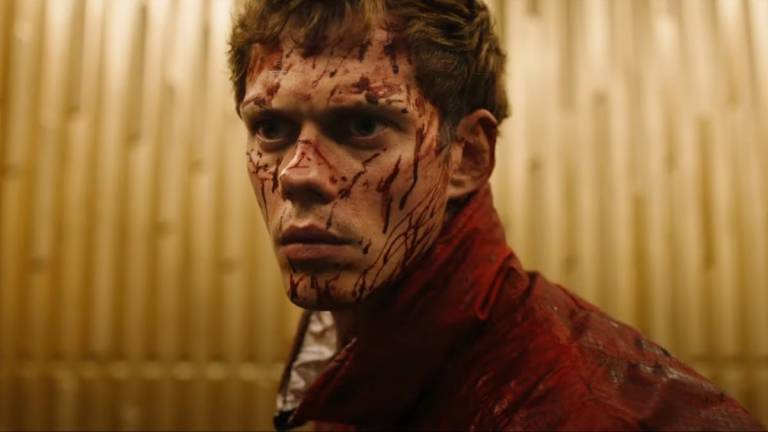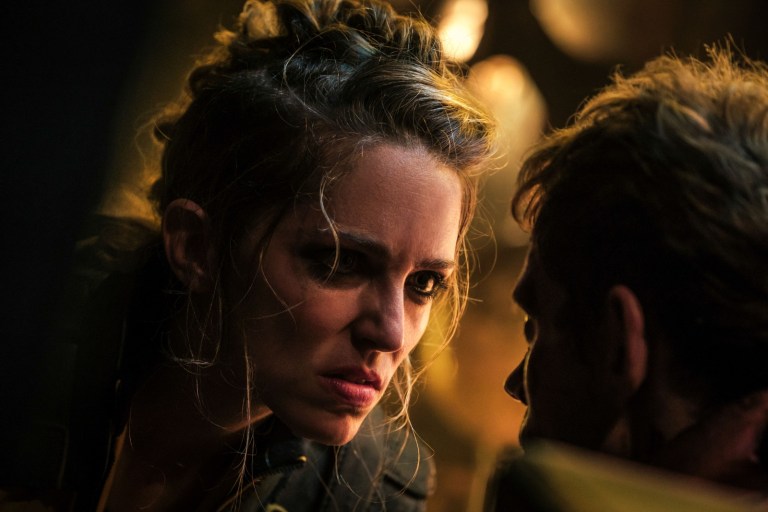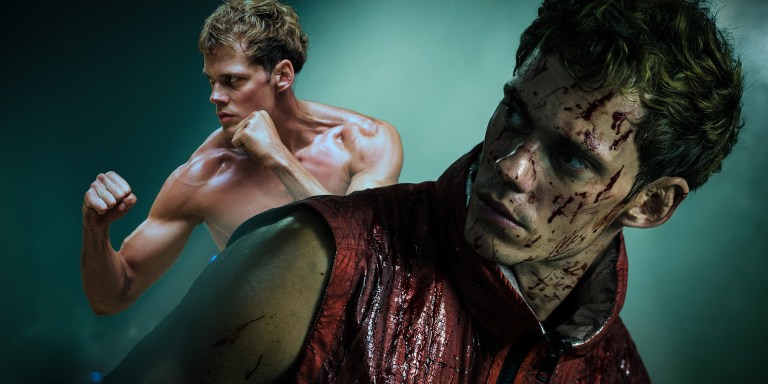When it comes to original movies, it’s tough seeing anything beating Moritz Mohr’s Boy Kills World in 2024. Part John Wick, part Quentin Tarantino’s wicked sense of satire, and a whole lot of fake blood and gore, this revenge story about Boy (Bill Skarsgård) hunting down Hilda Van Der Koy (Famke Janssen) for killing his family is an acquired taste. Yet, despite the violence on display, Boy Kills World harbors a strong anti-violence message that’s hidden behind all the brutal action on display.
Be warned: Spoilers ahead.
Multiple bad guys feel Hilda Van Der Koy went too far.
It isn’t unusual for foot soldiers to switch allegiances in a movie, especially when their hides are on the line. However, in Boy Kills World, two prominent antagonists, who are related to the ultimate baddie, confess to Boy that Hilda has gone on for too long and they want to see the reign of terror stop. First up is Glen Van Der Koy (Sharlto Copley), who offers his assistance to Boy and Basho (Andrew Koji) in locating Hilda. Sure, his help doesn’t last too long after Basho unwittingly drops a bench vice on his head–and his stooging turn is questionable here–but it’s the thought that counts, okay?
Later in the film, Gideon Van Der Koy (Brett Goldman) bemoans how the annual Culling events are nothing more than glorified massacres. Despite Gideon also having played a role in all the violence, he acknowledges it needs to stop. Essentially, he gives both the encouragement and tools for Boy to end it once and for all.
What’s striking about the twist in Glen and Gideon’s shared behavior is the self-awareness of how the violence isn’t helping matters. While they have undoubtedly profited from Hilda’s bloodlust and enjoy a cozy lifestyle, they are acutely aware that this doesn’t benefit anyone in the long run. They reached the point where enough is enough.
Violence begets violence in ‘Boy Kills World.’

The biggest twist in Boy Kills World takes place when it’s revealed that Boy murdered the Shaman’s (Yayan Ruhian) family and is none other than Hilda’s son. Instead of the Shaman killing Boy, he brainwashed and turned him into an assassin to get revenge on the Van Der Koys. The revelation changes everything, but it highlights something important here: Violence only breeds violence as hurt people hurt people.
Anyone can relate to the Shaman’s rage. He watched his entire family be killed. However, Boy is also a victim of violence as it’s Hilda who forces him to commit the act. Out of pain, Shaman commits to dissolving Boy’s memories and turning him into his weapon of war. In the end, though, this doesn’t bring back Shaman’s family. All he does is destroy another child in his quest for vengeance.
Similarly, Boy needs to face the realization of his own complicity in the murder of the Shaman’s family as well as being programmed to become a killing machine. It’s clear the constant hallucinations of Mina (Quinn Copeland) are a reflection of his conscience crying out to him, as he understands violence isn’t the solution. At his core, he’s still a boy who has been broken by the cruelty of those who used him as their pawn.
Boy and Mina choose a different path in the end.

Make no mistake about it, when Boy and Mina/June27 (Jessica Rothe) find out the truth, they are forced to scratch, claw, and slash for survival. They unleash a level of violence that neither of them has likely experienced before–both against Hilda, her guards, and the Shaman. In the end, they understand they’re free and able to live their lives how they choose. It’s a chance for them to break the cycle and choose new paths to follow.
Looking back at all the bodies in their wake, it serves as a reminder of how the violence changed nothing and brought heartache to everyone. The only time they feel different–alive–is when they realize they have each other once again, when they are able to share smiles and memories. Moral of the story: Choose macarons, not weapons.

